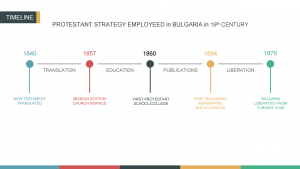Protestant Strategies in Bulgaria during the 19th Century
April 20, 2015 by Cup&Cross
Filed under Featured, News, Publication
Historical and Doctrinal Formation of Holiness Teachings and Praxis among Bulgarian Pentecostals (Research presentation prepared for the Society of Pentecostal Studies, Seattle, 2013 – Lakeland, 2015, thesis in partial fulfillment of the degree of D. Phil., Trinity College)
The early Bulgarian protestants were mainly Methodists and Congregational. They followed the strategy of the American and British missionaries, which began with a translation of the Bible in the 1840s, followed by the first mission stations and protestant services in the 1850s.
In the following decade, Protestant schools were established in over a dozen Bulgarian cities. A broad stream of educational publications were translated and provided to schools, churches and the open public. The final goal of the missionary strategy was the establishing of churches, which began in the 1870s and continued onward.
The main sources of influence were the American Board of Commissioners for Foreign Missions (setup in Boston) with its local centers in Turkey and then Bulgaria; as well as from the British and Foreign Bible Society which also had centers in Constantinople and its main Slavic arm through the Russian Bible Society based in St. Petersburg.
Additionally, Baptists entered Bulgaria with their own mission work in 1875 and the Adventists in 1891. Although there were no Presbyterians churches in Bulgaria at that time, many of the agents sent by American Board of Commissioners for Foreign Missions were in fact Presbyterian and were educated at Princeton and Drew along with many Bulgarian protestants who studied abroad.
With all these key players present, Bulgaria was eventually introduced to the rise of Higher Criticism (1880–93) and consecutively to the movement to revise the Westminster Confession of Faith (1900–1910). It was met with great resistance among Bulgarian churches. In this context, the search for holiness among Bulgarian evangelicals began at turn of the 20th country not only as an alternative to the liberal theological thought and praxis, but as a move toward a renewed spiritual identity, which ultimately became the channel for introducing Pentecostal-Holiness teachings.
Working Strategies
January 30, 2006 by Cup&Cross
Filed under 365, Missions, Publication
During our time of ministry in Bulgaria, we use several strategies for ministry, but that of Market Place Ministry proved to be best suited for the setting. Theoretically, this approach to ministry is not new for the Christian church. It simply implements taking the Gospel to the people, instead of expecting the people to come to the Gospel.Fundamentally, Market Place Ministry is a Biblical method, which has also found its place in a number of modern day management paradigms. John Maxwell finds it implemented in the business paradigm called “Management by Walking Around” (MBWA).
Being rather an Oriental approach, it is often seen in the ministry of Jesus and the apostles, it is normal that in a Western context it remains difficult to implement. However, for Bulgaria where the economy, social life, and the community are built around the market places, it fits perfectly.
We are combining the Market Place Ministry with media ministry into a dynamic paradigm which takes the Gospel to the people and transformed their lives in their own social context. The downside of such paradigm is that a ministry team cannot be confined to a certain location like a church building or an office, but must be constantly on the go. This however, turns to be the very effectiveness of the paradigm as it brings the church out of its comfort zone to a place of real life-changing ministry in the market place.








